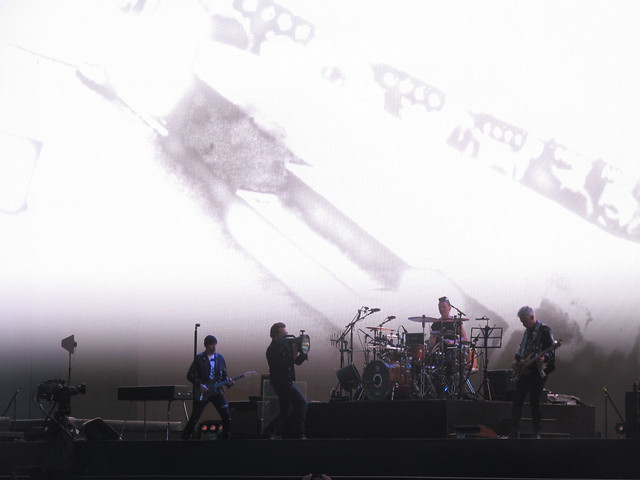
U2 - "The Joshua Tree Tour" - London 8-9 July, Dublin 22 July, Brussels 01 August 2017
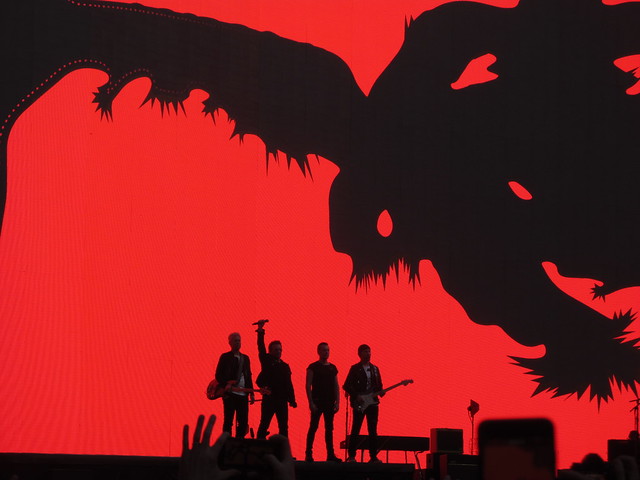
If you're like me – let's hope you aren't – on 31st December 1989, you would be at home with two cassette tapes, recording U2 at Dublin onto 2 x C60's, whilst your Mum and Dad were out getting drunk.
Since then, everything has changed, and nothing has changed. I'm still that kid, just older and bigger and taller with more years on me.
You may be surprised to hear this, but for me, this tour by U2 – a “Joshua Tree #30 Tour” where they play an old album in full – is one I didn't originally want. Certainly, I get to hear several songs live for the first time. But I don't get the U2 of now. I get a U2 of now, from then, playing songs of then, now. It's kind of weird, and also, somehow, also, a way to go back and glimpse what happened. How we got here. Where we are going, and – in the words of the missed David Bowie – where are we now.
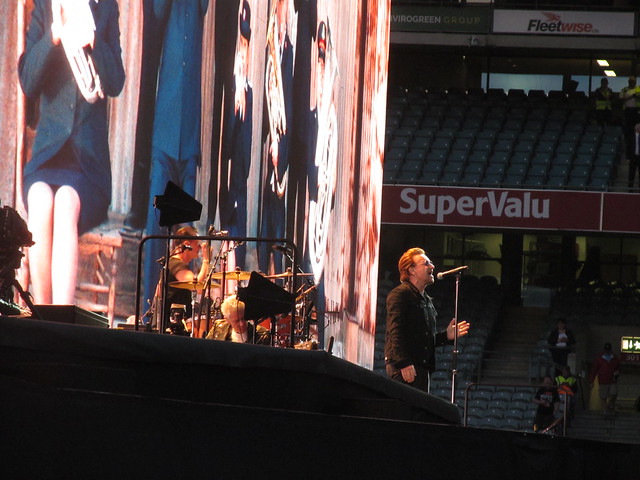
And for the first time, U2 are looking back and travelling forward, not just going forward. This tour – as powerful and well executed as it is – is a reminder, and a restatement, of how good U2 were and not a statement of how good they still are. It's been a long time since then, but it's still then. The band have long been chasing a degree of commercial relevance and currency : but rock is a young mans game, and even the biggest band of all time have to realise that there comes a time when perhaps the game you should play is Being The Best U2 You Can Be, and not anything else. Imagine, if you will, a picture, where The Beatles stayed together, where in 1997 they were touring “Sgt Peppers” in full, and where they were collaborating with The Prodigy. That's the world they could have ended in. That's the world U2 are in danger of touching but this tour is a side step, perhaps a readjustment of direction.
Despite seeing several shows on this tour, and I love seeing U2 tour, but I'd rather, if I'm honest, they be touring something else. It's on the face of it a commercial transaction rather than an artistic endeavour. It's fascinating to see, but a tour where some nights the youngest song is still 13 years old isn't always satisfying. I understand the feeling from many people of the purpose of art and music ; to some, music is the reminder of what you once were, the dreams you had you traded for work and pension plans. To me, and others, what's important and vital is not where I came from, but where I am at. Live in the now. Music and art helps me find where I am in the world today, not where I once was.
At a 30 year remove, the songs that U2 have generally written have always been – like the best songs - out of time, or timeless, beyond the confines of the year of recording, but wider. Sure, there have been cultural touchpoints to individuals that now seem antiquated, but the themes are sadly common – and repeating themselves. “The Joshua Tree” as it was is a record that seems to be fixed in certain economical, ethical, social situations, coming from a time of political class warfare between the workers and the bosses just seconds before the fall of the Berlin Wall, the air that penetrated that album always seemed to be that of a perception very clearly of the pain of inequality, - songs around poverty, hope, or the relationship that exists between people, money, and power. These days, the pendulum of politics has swung back to the same time as the Eighties – what I regard as the political dark ages in the eternal, endless battle between People and Power : these days, by design or not, the subtle war has shifted in the favour of the unequal who have more than they could ever need who still take the little left from the hands of the struggling.
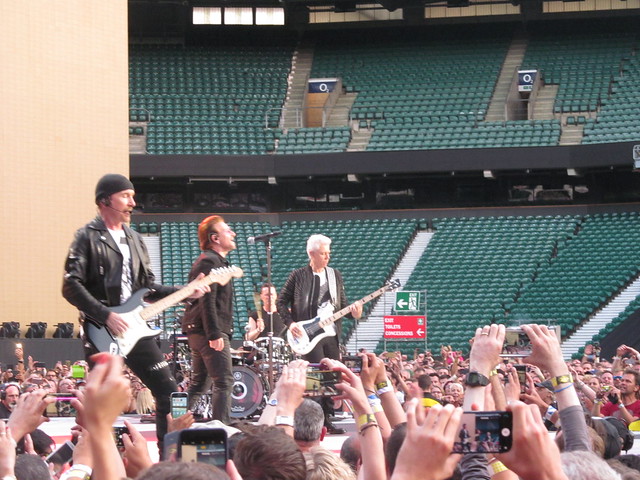
Put in that light, “The Joshua Tree” feels like an album for now that happened to come out 30 years ago. It's depressing to think that for all the advances we've made the past 30 years, some of the key problems still exist : the fierce inequality of poverty, the grinding nature of the system that uses us up and throws us away, and where the journey goes on is still real.
Opening with a short 4 song set of early hits, U2 play the first 30 minutes on a B-Stage in the crowd, with no cameras or video in harsh daylight, effectively supporting themselves (and dependent on where you are in the crowd, they are barely visible dots) showing how they got here and ending with a set built on where they are going next. For each night I see, it's the established warhorses of “Sunday Bloody Sunday” and “New Years Day” - the latter of which hasn't been a setlist staple since 1998 – “Pride”, and almost always “Bad.” This early in the set, “Bad” doesn't quite belong here. “Bad” in a show feels like a song that's generally earnt its place as a show closing climax. Here the band are on for less than 10 minutes before they play it. In London and Brussels, the band then slip into a medley of David Bowie's “Heroes” and “Where Are We Now?” (recognising the huge influence he had on near enough everybody, and also in London at least, being a local boy). Bowie's influence has been big on recent tours ; “Space Oddity” was the walk in music on 2009-11's tour, and had a key visual moment on the 2015 shows. Here, the band nail “Bad” ; but it feels too soon. In Brussels, particularly, the band bend and twist the song a little, to a new shape, in the intro with a pounding, building, hypnotic groove. All of this is the band orienting themselves ; this is where we came from, this is where we were.
In Dublin, playing “Bad” is actually a huge disappointment – not because of what it is, but what it isn't. On this tour U2 have brought back 'A Sort of Homecoming' as an occasional song for the first time in 30 years – otherwise having only played it twice between 1988 and 2017. And yet, in Dublin it is bafflingly absent even though the band have a longer stage time set than normal and they're playing their hometown. Despite being played several times, and fan requests at near enough every show and interaction, the band haven't made a gesture to the large number of fans who have flown, in some cases thousands of miles, to get here. It's not that any show is bad – but every band, whether they know it or not, have a contract with the fans to please not just themselves but also others. Not playing that song may be a little thing, but it is the little things that give you away.
It may be that the band didn't like how it was sounding, or that it didn't quite 'gel' for them. The bands opinion isn't always the only one ; after all, if it didn't work – and it would have – even if they didn't think it would, it would have been over in four minutes (about the length of one of Bono's many speechifying interludes) and many, many people would have been very happy. Instead we get the same setlist as Barcelona, and aside from Bono's rambling speeches – and one moment I'll touch on later – the band might as well be playing Zurich from where I am in the crowd. I don't like moaning, for U2 pride themselves on always playing a strong show and earning their money (and what a lot of it there is), but it's fair to say that many many other bands would make a slightly more specialised effort for their hometown show, as well as the show with probably the highest proportion of travelling fans of any of their gigs.
Especially as two songs that are rarely played on the tour that fans have been vocally hoping get played 4 days later in Paris.
It's still staggeringly light, and come barely 9.20, everything suddenly and clearly goes ever so slightly bonkers. “Where The Streets Have No Name” is here : complete with a full, and angry huge wall of red – and whilst this is utter showmanship – I'm staring at U2, looking just like the cover to the “Desire” single – in Dublin. It's definitely the image that defines the tour. The guitar chords chime, the toms kick in, the bass rumbles, and about 80,000 collectively lose their shit.
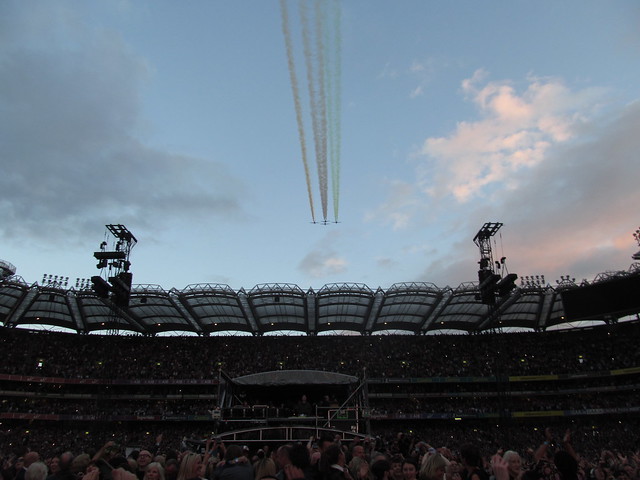
(Talking in the Off-Camera podcast with Sam Jones, The Edge describes that moment at Croke Park in 2009 as being one of the best moments of his life).
A couple of minutes later, the second verse starts, and Larry moves from toms to snares, the song rises up a key, and we see something out of the corner or our eyes. Four small dots, trailing smoke. White, Green, Orange trails. A roar in the crowd. A roar in the air that I cannot remember if you can hear above the noise and the confusion.
It's the moment that defines the gig for me. The band are there, the verse kicks, and suddenly, there's a roar, there's hands in the air, cameras are whipped out, and the stadium gets a low level flyby by four fighter jets trailing the colours of the country. It's … something unique.
It is the kind of moment that deserves a photograph. Not every moment does. Not, for example, “With Or Without You”, which is largely seen through the screens of iPhones.
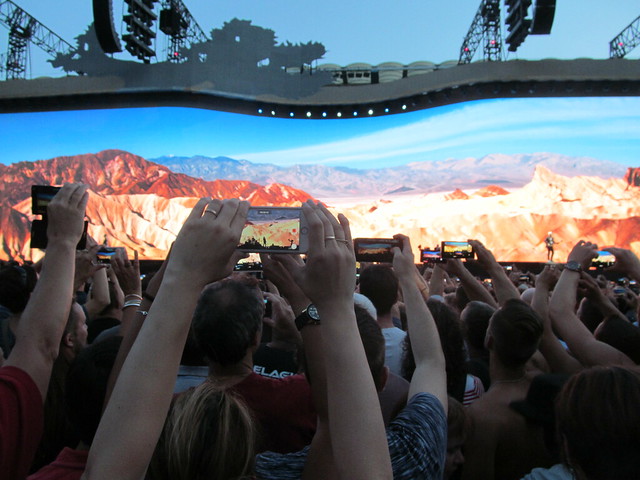
See the stone set in your eyes
See a sea of cameraphones
I wait. For U2.
Of course, there's the rest of the album to follow. Some might call playing the second side of the biggest selling album of all time a “Deep Cut”, but when The Joshua Tree has sold more than every other album etc., even the darkest of songs sound like a greatest hit. Certainly, when presented live, “In God's Country” sounds like an unstoppable glorious song that should never have left the live repetoire. With luck, some of these songs will come back to regular rotation – and in particular the final two songs of the album are stormingly effective live.
Before we get there, the first side of “The Joshua Tree” is well known and has been largely a staple of live sets for three decades. Side two has one song never played live before - “Red Hill Mining Town” - which is ok live, but in a concert context isn't as successful as some of the other songs. One of the risks of the Album-in-full shows is that albums are designed to be listened to at home or on the move on your own ; not with 80,000 people standing around you in a football stadium on a Saturday night. “Red Hill” sees a considerable rush for the bar and the toilets : every gig has what I call a 'bog break' song, and “Red Hill” – like it or not – is the one for this tour. There is probably a tangible rush during this. Following this up is “Trip Through Your Wires” which again is good, but with a back catalogue as strong as U2's, it's not a song that they often play, nor one that particularly stands out in the live experience. What playing the whole of this album does show though, is that U2 can play near enough any song live – if they want. The final two songs of the album though, are “Exit” and “Mothers Of The Disappeared”.
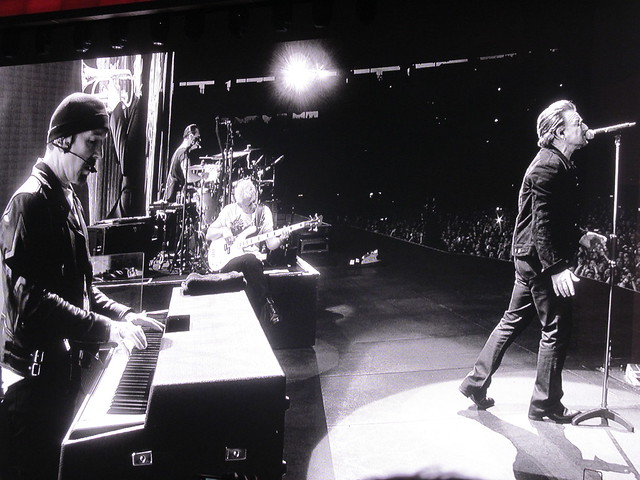
Set inside a live context, “Exit” is a song that perhaps U2 could bring back and play much more frequently : here it is as effective, as powerful, as biting – more so in fact – than “Bullet The Blue Sky”. Whereas “Bullet” has been played on 8 of the past 9 tours, and it has been, to be honest, boring, predictable, and tired at some shows.. it's good – but not as good as U2 think it is. Every last vestige of interpretation and life has been wrung out of “Bullet” over the past 900+ performances, and it needs a break now. “Exit” though burns and shimmers with a fire that I haven't seen from the band in a long time. It's a song that should replace “Bullet” in live sets in future, born again with new meaning and excitement. I wasn't sure U2 could do justice to it now that they are older, but I'm not sure its ever sounded better.
Finally comes “Mothers Of The Disappeared” : rarely played in Europe [there was a brief performance in Dublin in 2009, but that's pretty much the only time], this song is a monster live, that combines all of the bands influences in something new, a pounding bass and a half-reggae groove coupled with a plaintive lament to create some new kind of genre – the intimate anthem. The stadium fills with a starfield of lights. This song also provides the narrative link to the 'encore', centrepinning one of U2's key causes of equality to a beat you can dance to.
The final forty minutes is a much better thought-out section, geared around a much wider choice of material, that works in the central themes of how all humans are One (man, woman, rich, poor, old, young) into something that makes as much sense as a very loud art gallery. No longer tied to a 30 year old running order, the encore sees for London and Dublin, the first ever performances of “Miss Sarajveo” in these towns. It's a gorgeous song – U2 at their most placid and thoughtful, that covers the fact that even in war, we are all ourselves, hoping, loving, dreaming, still people, not merely fighters or survivors. It's the song that has been played the most that hasn't yet been played live in Dublin … yet (at 183 performances), as well as the song that has the longest gap between release/first live performance, and appearance in London or Dublin – at 20 years. Given the content, the set is tied by lyrics, to put old songs in new environments, where this song draws a clear line between the inequalities and heartbreak of political mass murder in unmarked graves, to that of death camps and warzones, to modern day refugees. Yes, Bono can speechify at the Olympic standard, and the shows have never needed that – all the themes, all the big ideas, are all in the songs. The band have always been striving for the big idea, the next lightbulb. Some artists seem content to find a box ; a gorgeous box of their own making, and never venture out. U2 don't mind trying new stuff – even if there's a whole bunch of old stuff in it.
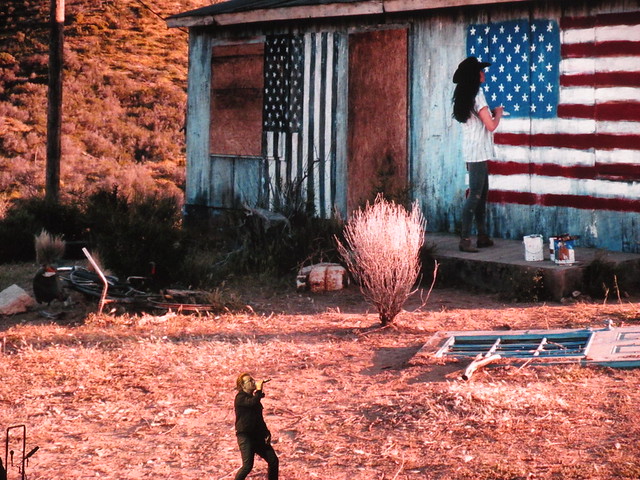
But every speech is a song I don't get.
On a performance level, the band have changed, the songs have changed, and Bono's voice has changed : he can no longer hit the high notes of “Running To Stand Still” or “Ultraviolet” or “Miss Sarajevo” so effortlessly, and so, the songs are different, down in key, and “Miss Sarajevo” now has Pavarotti's recorded vocals for the end, rather than Bono singing his heart out as he did just six years ago. It's still a show with the same fire, the same intention as any before, but the flesh is starting to show its age at the edges.
But also, it's entertainment as well as some form of mass populist art. People like the hits. And even when there's deep cuts in there, there's also the old biggies. Any set that presents between 13 to 16 hit singles in it can hardly be anything but. Lyrically there's no place for “Vertigo” in the set – but it's a big fat racket that makes the room bounce like demented ducks – and the last genuinely huge crossover hit U2 ever had. Maybe their time now is far beyond the world of mass communication and hits but in being a huge, self-contained artistic entity that doesn't try to get on the radio but should concentrate instead on getting into your mind and heart instead. They're 20 years past “Pop” now and definitely post-pop in their careers.
Perhaps the biggest gripe is the legitimate one that the show is the first backwards looking tour the band have done, the first one where on some shows the freshest song is still 13 years old, and where significant parts of their work are ignored. And there's still nothing off over half the albums they have made. On the other hand, there's 80,000 people playing air guitar to “Vertigo” and “Elevation” so that's not … always a bad thing. After an hour of being told Poverty Is Sexist, War Is Bad, We Are All One, it's refreshing just to cut loose.
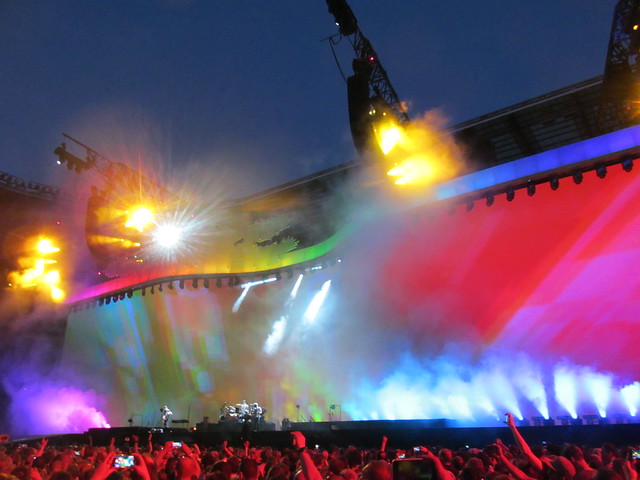
As we come to the end though, there's a sense – justified or not – that perhaps this is a money driven tour, being placed as a springboard to propel the band back into consciousness before the next album which is being readied for probable launch, and the next tour following that. Always one eye on the future. Maybe U2 don't even know themselves exactly where they are going next, but one of the great things about growing older is seeing how we still fit into the world (if we do), and how we make the world the place we want it to be. In Brussels they close with a raucous, adrenalin rush of “I Will Follow”, a tasty and biting slice of post punk that is both aware and sincere, and still sounds as thrilling as the first time I ever heard it. It's a way to end, with where we started, ending where they began, four boys playing rock'n'roll with crazy ideas to make a difference but it also is a message to the audience who may have deserted them in times of strife. If you walk away, I Will Follow. Whilst nearly 50,000 mostly-Belgians dance around happily.
With that, the European leg is over- for now – and over the several shows, and friends old and new, we scatter to the edges of the world, waiting for the time this will happen again, be it next year or the year after, or whenever, disbanding temporarily the family and kinship built out of a common love for the same songs. This is this, and this is here and now, and there will be other shows, other nights, other moments, because even if we are nearer the end than the beginning, this is not over – yet – and we have the pleasure of seeing moments like this with our own eyes rather than reading about it in books in the future. We have to live in the here and now.
We said hello and goodbye to many songs for what is probably the last time - the old friends will be missed. Many of these songs have found new life this year, and I hope to see them again on future tours : but if not, we had this. A glorious and unexpected reframing of the songs to make old feel new again.
The future beckons - What a swell party it is.
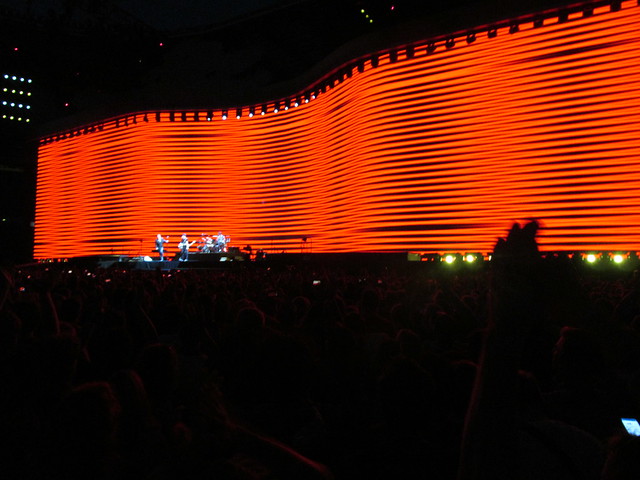
Sunday Bloody Sunday
New Years Day
Bad / Heroes / Where Are We Now?
Pride
Where The Streets Have No Name
I Still Haven't Found What I'm Looking For
With Or Without You
Bullet The Blue Sky
Running To Stand Still
Red Hill Mining Town
In Gods Country
Trip Through Your Wires
One Tree Hill
Exit
Mothers Of The Disappeared
Miss Sarajevo
Beautiful Day
Elevation
Vertigo
Ultraviolet (not London #2)
Mysterious Ways (London #2 only)
One
The Little Things That Give You Away (not Brussels, or London #2)
I Will Follow (Brussels only)
Don't Look Back In Anger (London #1 only)
